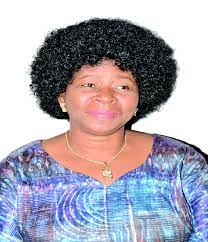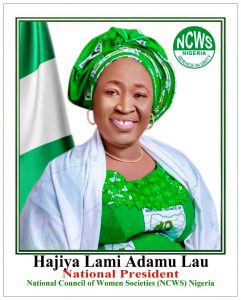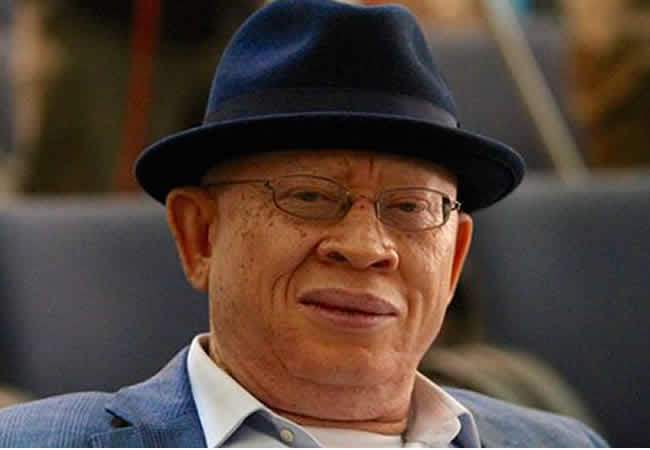40% WOMEN REPRESENTATION PROMISE IN NIGERIA?!!! – A FARCE ? ENE OBI CHARGES PRESIDENT MUHAMMADU BUHARI!
Reports Lady Nkiru C. Okoro
“Fulfill your 2018 election campaign promise to Nigerian women while there is still time,” Ms. Ene Obi, Convener, Nigeria Civil Society Situation Room, and Country Director, Action Aid Nigeria has urged President Mohammadu Buhari.

Ms. Ene Obi.
Speaking at the flag of ceremony of the 2022 16 days activism on gender-based violence in Abuja by the Federal Ministry of Women Affairs, Ene Obi opined, “President Buhari said, if he won, the 2019 general elections, he would give 40% appointive positions to Nigerian women.” This promise is yet to be actualized seven months to the end of his second tenure. Nigerian women are waiting for the President to fulfill his election promise.
Refering Nigeria’s Multi-Dimensional Poverty index report released in November 2022 by the National Bureau of Statistics (NBS), that 133 million Nigerians are living below the poverty line of less than one US Dollar per day, She said, “this is unacceptable”.
Recalling world bank’s 2022 Poverty Index report released in February 2022, showing that 95.1 million Nigerians will be poor in 2022, the NBS report showed a gory and dismal poverty reality of Nigeria, worsened by the recent flooding of over 31 states of the federation. These reports, reaffirm Nigeria as the poverty capital of the world according to 2019 world bank’s and Brookings Institute’s Global Poverty Ranking Index report. Lamenting over these reports, Ene said, “You can only imagine what is happening to women when they are in the flood.
Ms. Ene Obi, used the opportunity of the ceremony to appreciate International Development partners and Nigerian women for their support of water and food supplies throughout the month-long occupation of the National Assembly.
Nigerian women in March 2022 “Occupied National Assembly” – following the rejection of the five gender bills by the ninth National Assembly. Ene explained that the movement was spontaneous and unplanned, and called on Nigerian women to plan to occupy again. “We need to occupy again”,. When we call on you when we are occupying the National Assembly again, please support us.
She congratulated The Honourable Minister for Women Affairs, Dame Pauline Tallen, and her Technical team led by Princess Jummai Idonije for working tirelessly to keep issues of Nigerian women on the front burner of national discussion always. She recognized various women groups ncluding Women in Politics forum, 100 women lobby group, and ll groups committing to achieving gender equality and empowerment of women and girls in Nigeria.
Ene decried the situation in Nigeria where are women continue to lose their lives to maternal mortality like no other country in the world; yet the country has not declared war or emergency on Nigeria’s health crisis.
At another level, the National President of the National Council for Women Societies in Nigeria (NCWS) Hajia, Lami Adamu Lau, pledged her
Members’ support and commitment to spreading the global and national campaign against gender-based violence to all nooks and crannies of Nigeria.

In her goodwill message, she assured the Honourable Minister that her message will reach the grassroots. She pledged the council’s support in continuing the” fight for other laws that impact negatively the lives of Nigerian women and girls, including the child rights Act 2003; the law against female genital mutilation, and laws eliminating all forms of violence against women.”.
We are going to continue our advocacy until all these laws have been implemented . As a leader of Nigerian women, mothers, children and grandchildren, we are going to fight together against gender-based violence, and by God’s grace, we are going to achieve this in the end.
The five rejected bills address citizenship issues for Nigerian women, reserved seats for women in parliament, 35% affirmative action principle in appointive and elective positions(Quota), and indigeneship, a law to allow Nigeria women who are married to foreign nationals to confirm their Nigerian Nationalities in the same way Nigerian men confirm their Nigerian nationalities to their foreign wives. The law also seeks to allow Nigerian women married into states other than their indegenous states to have equal status, rights, and privileges as natives of their husbands’ states. All five bills were ejected by Ninth National Assembly lawmakers who chose to kick off 2022 International Women’s Month with an almost-homogenous dismissal of issues plaguing sustainable development of Nigerian women.
While this is worrisome, it is not new. Nigeria has one of the lowest numbers of female representation in the world , ranking 181 out of 193 countries with only 3.6% female representation in parliament. Women hold only 9.8% of local government seats, and 30.3% of managerial positions, and rank 27.3% in the financial inclusion index.
The Marriage Act in Nigeria does not set a minimum age for marriage. Section 55 of the NNigerian Penal Code allows a husband to beat or chastise his wife provided he does not inflict bodily injury on her to correct her; not minding the effects of the psychological trauma of verbal violence on the mental health of Nigerian women.
Section 26 of the 1999 constitution as amended limits the right of the Nigerian woman to transmit her nationality to a foreign husband, and the Nigerian criminal code does not recognize marital rape.
“Women and girls in Nigeria should have the right to live in dignity, free from discrimination, and must be able to fully enjoy their human rights without exclusions based on gender.” This includes women’s rights to political participation and governance.
Specifically, women protested against the denial of citizenship to a foreign-born husband of a Nigerian woman. Women’s inability to become indigenes of their husband’s state after several years of being married, and the denial of 35 affirmative actions in appointive and elective positions in political party administration and leadership positions in the country. Women protested against the rejection of allotting specific/special seats for women in the National Assembly. That the bills were rejected a day after the celebration of the 2022 International Women’s Day was a slap to all women in Nigeria.
There is a consensus that if some of these bills are represented as state’s bills, women may perhaps be able to achieve some measure of success.
In the upcoming 2023 general elections, only 10.1 percent are female candidates. Out f 15,307 candidates, 1552 are women. This reaffirms Women’s Political Participation – Africa Barometer – 2021, published by International IDEA publications in Stockholm, Sweden, that Nigeria stands at the bottom of the ladder in women’s political participation at 6% national average, far below Africa’s regional average 33% in the Horn of Africa and 16% in West Africa”.

Mr. Epelle, President, Albino Foundation In Nigeria
For Mr. Epelle, President, of Albino Foundation In Nigeria, he said, “By standing on behalf of every man not only in Nigeria but across the world, I apologize to every woman, whether you are physically violated or feels violated. May I render unreserved apologies and assure that going forward, people like me and others will fight for your rights.” Thank you.
